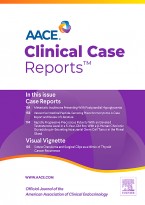
چکیده فارسی
نقش استروئیدها در هیپوگلیسمی مقاوم به درمان به دلیل مصرف بیش از حد 10000 واحد انسولین گلارژین: گزارش مورد و بررسی ادبیات
چکیده هدف: مصرف بیش از حد انسولین گلارژین یک وضعیت اورژانسی است که باعث هیپوگلیسمی طولانی مدت و مقاوم می شود که ممکن است منجر به کما و حتی مرگ شود. ما یک مورد مصرف بیش از حد عمدی را با بالاترین دوز گزارش شده 10000 واحد انسولین گلارژین (Lantus®، 100 واحد در میلی لیتر) ارائه می کنیم. علاوه بر استفاده از گلوکاگون و اکتروتید، در اینجا مزایای افزودن استروئیدها به رژیم را گزارش می کنیم. روشها: گزارش موردی همراه با مرور ادبیات است. نتایج: یک زن 36 ساله تقریباً 44 ساعت پس از مصرف بیش از حد 10000 واحد انسولین گلارژین مراجعه کرد. بیمار در بخش مراقبت های ویژه بستری شد و نیاز به تزریق مداوم دکستروز به مدت 150 ساعت همراه با بولوس های مکرر دکستروز 50 درصد داشت. درمان های دارویی مورد استفاده شامل گلوکاگون برای ترویج گلیکوژنولیز و گلوکونئوژنز، اکتروتید برای جلوگیری از هرگونه ترشح انسولین درون زا از پانکراس و استروئیدها برای اثرات هیپرگلیسمی آنها بود. اگرچه تأثیر زیادی روی سطح گلوکز خون با گلوکاگون و اکتروتید مشاهده نشد، استروئیدها پس از شروع نیاز به دکستروز را کاهش دادند. بیمار در روز ششم به بخش روانپزشکی به خارج از مراقبت های ویژه منتقل شد. نتیجهگیری: پزشکان باید در نظر داشته باشند که مصرف بیش از حد انسولین گلارژین میتواند تهدیدکننده زندگی باشد، زیرا هیپوگلیسمی میتواند شدید و طولانی باشد، بنابراین نیاز به بستری فوری در بخش مراقبتهای ویژه، بررسیهای مکرر قند و انفوزیون مداوم دکستروز همراه با نظارت دقیق الکترولیت دارد. در حالی که هیچ گزارش موردی قبلی از استفاده از استروئید برای مصرف بیش از حد انسولین وجود ندارد، اما ثابت شد که آنها در مورد فعلی مفید هستند. مخفف: D50 dextrose 50%
چکیده انگلیسی
Role of Steroids in Refractory Hypoglycemia Due to An Overdose of 10,000 Units of Insulin Glargine: A Case Report and Literature Review
ABSTRACT Objective: A massive overdose of insulin glargine is an emergent condition that causes prolonged and refractory hypoglycemia, which may lead to coma and even death. We present a case of an intentional overdose with the highest reported dose of 10,000 units of insulin glargine (Lantus®, 100 units/mL). In addition to the use of glucagon and octreotide, we report here the benefit of adding steroids to the regimen. Methods: The case report is accompanied by a review of the literature. Results: A 36-year-old female presented nearly 44 hours after a massive overdose of 10,000 units of insulin glargine. The patient was admitted to the intensive care unit and required continuous dextrose infusion for 150 hours along with frequent dextrose 50% boluses. Pharmacological therapies used included glucagon to promote glycogenolysis and gluconeogenesis, octreotide to prevent any endogenous insulin secretion from the pancreas, and steroids for their hyperglycemic effects. Although not much effect was noted on blood glucose levels with the glucagon and octreotide, steroids did bring down the dextrose requirements after they were initiated. The patient was transferred out of intensive care on day 6 for the psychiatric unit. Conclusion: Physicians should keep in mind that a massive overdose with insulin glargine can be life threatening because the hypoglycemia can be severe and prolonged therefore it requires prompt intensive care unit admission, frequent glucose checks and sustained dextrose infusion along with close electrolyte monitoring. While there is no prior case report of steroid use for insulin overdose, they proved to be beneficial in the current case. Abbreviation: D50 dextrose 50%






